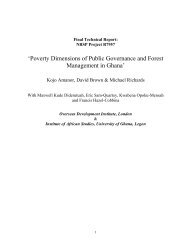The Gambian Tourist Value Chain and Prospects for Pro-Poor Tourism
The Gambian Tourist Value Chain and Prospects for Pro-Poor Tourism
The Gambian Tourist Value Chain and Prospects for Pro-Poor Tourism
Create successful ePaper yourself
Turn your PDF publications into a flip-book with our unique Google optimized e-Paper software.
<strong>Tourism</strong> in <strong>The</strong> Gambia: International ‘Best Practice’ in Poverty Reduction & <strong>Pro</strong>-<strong>Poor</strong> Growth Through <strong>Tourism</strong><br />
Draft Report (Friday 22 nd December 2006)<br />
Executive Summary<br />
This study examines the current state of tourism in <strong>The</strong> Gambia, West Africa, <strong>and</strong> proposes<br />
a series of practical measures to enhance the flow of benefits to the poor. It is based on a<br />
framework of international ‘best practice’ <strong>for</strong> boosting benefits <strong>for</strong> the poor, combined<br />
with innovative local economic analysis that maps the current flows of benefits to a range<br />
of stakeholders from the tourism value chain in <strong>The</strong> Gambia.<br />
<strong>The</strong> Gambia is a well-established ‘winter sun’ tourism destination with 110,800<br />
international arrivals in 2005. Almost all tourists are holiday-makers <strong>and</strong> 84% are on holiday<br />
packages that generally include flights, transfers <strong>and</strong> bed <strong>and</strong> breakfast accommodation in<br />
a hotel.<br />
<strong>Tourism</strong> is a significant sector in the <strong>Gambian</strong> economy, representing about 13% of national<br />
income <strong>and</strong> 19% of all private sector <strong>for</strong>mal jobs. As our focus is pro-poor tourism, though,<br />
it is the nature of linkages between tourism <strong>and</strong> the local economy that are critical – rather<br />
than just the aggregate size of the tourism sector.<br />
Applying value chain analysis to the tourist package suggests that most of the value is<br />
absorbed by the international tour operator, the airline company <strong>and</strong> the hotel at the<br />
destination. <strong>The</strong> share of the package that each of these three stakeholders receives varies<br />
depending upon dem<strong>and</strong> conditions. In periods of low dem<strong>and</strong>, hotels may receive only<br />
about one-fifth of the package price but during the peak almost one-third of the higher<br />
priced winter package – a more positive scenario than some of the ‘leakage’ pessimists have<br />
asserted. Gambia will capture more of the tourist package value if it stimulates dem<strong>and</strong> by<br />
destination marketing <strong>and</strong> takes steps to improve the current imbalance between supply<br />
<strong>and</strong> dem<strong>and</strong> <strong>for</strong> lower end hotel accommodation during the low season.<br />
<strong>The</strong> holiday package part of the tourist value chain (flights, plus bed <strong>and</strong> breakfast<br />
accommodation) largely by-passes the poor - the only significant linkage being the wages<br />
paid to non-managerial hotel staff. <strong>The</strong>re are changes that could enhance the pro-poor<br />
impact of this value chain, such as increasing hotel staff wages <strong>and</strong>/or reducing seasonality<br />
effects to improve job security.<br />
<strong>The</strong> great achievement of <strong>Gambian</strong> tourism is the scale of the pro-poor benefits derived<br />
from the relatively high levels of out-of-pocket, or discretionary, expenditure by<br />
tourists. Items such as food <strong>and</strong> beverages, shopping <strong>and</strong> excursions account <strong>for</strong> less than<br />
one-third of the tourism value chain but are highly pro-poor in their impacts. Most of these<br />
expenditure items relate to <strong>Gambian</strong>s who sell goods <strong>and</strong> services directly to tourists, such<br />
as craft market stall holders, fruit <strong>and</strong> juice sellers, taxi drivers <strong>and</strong> guides. <strong>The</strong> pro-poor<br />
impact of these activities (meaning the wages earned or revenue received by the in<strong>for</strong>mal<br />
sector <strong>and</strong> employees) are around one-quarter to one-half of expenditure on these items of<br />
expenditure.<br />
We know a lot less about the indirect linkage between the dem<strong>and</strong> <strong>for</strong> food from tourist<br />
hotels <strong>and</strong> restaurants on the one h<strong>and</strong> <strong>and</strong> the farmers <strong>and</strong> fishermen some of whom<br />
appear to be accessing the tourism value chain on the other. It seems that this linkage<br />
could involve large numbers of very poor people – probably even greater numbers than<br />
those with direct links to tourists <strong>and</strong> certainly spread geographically beyond the tourist<br />
‘enclave’. In addition, <strong>and</strong> critical in terms of scale of pro-poor impact, is the fact that the<br />
dem<strong>and</strong> <strong>for</strong> food generated by tourists is such a large component of total tourist<br />
expenditure.<br />
This success with which the <strong>Gambian</strong> poor have captured a part of the tourist value chain<br />
does not seem to be an accident. It appears to be the result of sustained ef<strong>for</strong>ts by<br />
<strong>Gambian</strong> non-governmental organizations, with international support, in reducing barriers<br />
to entry <strong>for</strong> small entrepreneurs to access the tourism value chain.<br />
This analysis questions a central focus on the strategy of targeting more up-market tourists<br />
as a means of benefiting the poor. Whilst some hotel owners <strong>and</strong> the <strong>Gambian</strong> economy<br />
as a whole may benefit somewhat from a move up-market, the poor will probably not

















